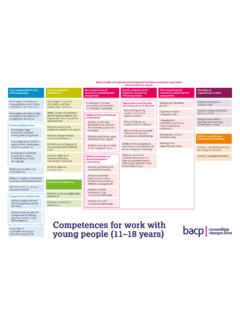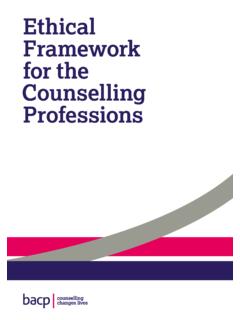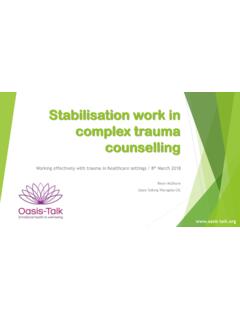Transcription of Counselling skills competence framework
1 Counselling skills competence frameworkCopyright information: Counselling skills competence framework is published by the British Association for Counselling and Psychotherapy, BACP House, 15 St John s Business Park, Lutterworth, Leicestershire, LE17 4HB. T: 01455 883300E: is the largest professional organisation for Counselling and psychotherapy in the UK, is a company limited by guarantee 2175320 in England and Wales, and a registered charity, 298361. Copyright 2020 British Association for Counselling and Psychotherapy. Permission is granted to reproduce for personal and educational use only. Commercial copying, hiring and lending are prohibited. Design by Steers McGillan Eves. The full listing of competences for Counselling skills is available online at skills competence frameworkAreas of competenceProfessional contextAbility to use Counselling skills within legal, ethical and professional guidelinesAbility to work within professional boundaries appropriate to role and settingAbility to use Counselling skills to enhance but not change the primary roleAbility to offer appropriate care and supportAbility to identify, assess and respond to risk and emergencyAbility to make use of professional support and guidanceEmpathyAbility to use Counselling skills to communicate empathic understandingAbility to use Counselling skills empathically.
2 To understand and respond appropriately to those experiencing painful and distressing emotionsAbility to use Counselling skills to work empathically with a diversity of persons, settings and situationsSkills and techniquesAbility to use a range of listening and responding skills appropriatelyWorking allianceAbility to use Counselling skills to establish, maintain and end the workAbility to use Counselling skills collaboratively Ability to use Counselling skills in interactions with other professionals, carers, friends and family of the person you are working withPersonal qualitiesAbility to use Counselling skills with self-awarenessAbility to draw on helpful personal attributesProfessional contextEmpathySkills and techniquesWorking alliancePersonal qualitiesCounselling skills competence frameworkProfessional context4 Professional context Professional context 1.
3 Ability to use Counselling skills within legal, ethical and professional guidelinesCommit to working ethically and policies and procedures relevant to role and Ability to work within professional boundaries appropriate to role and settingMaintain a professional role appropriate to the and work within personal and professional limits of ability, maintaining ongoing personal awareness of own capacity and to establish and maintain agreed time to explain to the person you are supporting why boundaries are to explain and maintain confidentiality and its limits including: legal limits to confidentiality, for example, safeguarding, terrorism ethical limits of confidentiality, for example, risk of harm agency or organisational confidentiality policies (where relevant)Ability to breach confidentiality safely and appropriately where necessary, acknowledging that sharing relevant information with relevant people at the right time may be sensitively to try to gain someone s consent if confidentiality needs to be breached, to share confidential information where needed and work together to access appropriate services.
4 Comply with data protection law and protect privacy according to role and skills competence frameworkProfessional context53. Ability to use Counselling skills to enhance but not change the primary roleAbility to: integrate Counselling skills into a primary role remain focused on the purpose of the primary role use terminology specific to role and setting identify and manage any potential tensions when embedding Counselling skills in a primary role4. Ability to offer appropriate care and supportAssessmentAbility to: support someone to identify what they need and want; understanding how care and support could help them achieve those outcomes assess the needs and wants of the person you are working with, identifying what support the person needs and wants reflect on own limits of ability to ensure the provision of appropriate and adequate care and support regularly review the work, to ensure that the support you offer is responsive to someone s needs and circumstancesReferral and signpostingMake appropriate referrals to relevant services by.
5 Using knowledge of own role, capacity and limitations when making referral decisions drawing on knowledge of a range of professions and professional roles and how they work together to provide the care and support someone needs communicating with other relevant agencies and organisationsCounselling skills competence frameworkProfessional context6 identifying external resources and supporting an individual to access and make the best use of these resources involving the person in the process, being sensitive to their need for privacy and confidentiality; unless the level of risk precludes this5. Ability to identify, assess and respond to risk and emergencyAbility to identify areas of risk, and work with someone to monitor and manage the risky and (or) harmful behaviour(s) by: ensuring appropriate support is in place and making referrals where necessary supporting someone to make a safety plan, identifying steps and resources needed to stay safeAbility to assess and respond to thoughts of to respond appropriately to emergency and crisis situations by: following risk and emergency procedures calming the situation where possible and looking for ways of reducing or removing risk informing relevant services or organisation(s) where appropriate6.
6 Ability to make use of professional support and guidanceEngage with professional support and guidance, for example: consultative support supervisory support and guidance line-management mentoring coachingCounselling skills competence frameworkProfessional context7 Use professional support and guidance to: monitor own personal and professional wellbeing reflect on the effectiveness of the work and the relationshipUse reflection and self-appraisal to review own use of a professional development open to receiving constructive feedback to improve and develop own use of skills competence frameworkEmpathy8 Empathy Empathy 1. Ability to use Counselling skills to communicate empathic understandingCommunicate empathic understanding and the qualities of empathy, unconditional positive regard and to apply empathic understanding to communicate kindness, compassion and empathy, self-awareness and Counselling skills to respond appropriately and in a timely manner to meet the needs of the person you are working to respond appropriately by being aware of own evoked feelings when working with Ability to use Counselling skills empathically.
7 To understand and respond appropriately to those experiencing painful and distressing emotionsListen to difficult and challenging emotions and let the person know you have heard and to someone talk about difficult and challenging emotions without trying to change the subject or avoid painful skills competence frameworkEmpathy93. Ability to use Counselling skills to work empathically with a diversity of persons, settings and situationsFacilitate choice; supporting people to make their own decisions wherever possible to promote and maintain autonomy, dignity, choice and on the person s priorities and wishes, by identifying and being sensitive to difference, and responding to their unique cultural, emotional, psychological and spiritual needs and offering understanding, respect and and work within the spirit of the Equality Act 2010, by.
8 Recognising own values, beliefs and principles and acknowledging that they may differ from other peoples recognising and addressing own prejudice, bias, stereotypes and assumptions recognising and addressing the impact of judgment, discrimination, bullying and harassment challenging discrimination in self and others appreciating and being curious about different cultures, values and beliefs listening with an open mind without judgment or opinionCounselling skills competence frameworkSkills and techniques10 skills and techniques skills and techniques 1. Ability to use a range of listening and responding skills appropriately Use a range of listening and responding skills appropriate to the role and setting.
9 Including both verbal and non-verbal clear and straightforward information and communication, avoiding jargon and overly complicated a range of Counselling skills effectively, for example: listening to verbal and non-verbal communication paraphrasing to communicate attention and understanding of content reflecting to acknowledge feelings and emotions restating repeating back to the person to acknowledge what has been said and to encourage the person to continue summarising giving an overview of what has been said focusing supporting someone to prioritise what to talk about or work on minimal encouragers using small gestures or verbal comments to acknowledge listening and offer encouragement for someone to continue talking, for example, nods, saying , facial expressions, hand gestures non-verbal communication for example.
10 Open posture and appropriate eye contact reframing to offer a different view questions use a range of different types of questions: open questions to support someone to explore their situation. Closed questions to gather facts, details and information self-disclosure a rarely used Counselling skill and only appropriate when the self-disclosure is for the other person s benefit and not used to coerce, induce or direct immediacy the ability to use what is happening in the moment for someone s benefit silence to allow someone the time and space to think things through in a safe and supportive environmentCounselling skills competence frameworkSkills and techniques11 challenge to gently bring someone s awareness to something they may have avoided or overlooked attend to verbal and non-verbal cues with understanding and insightAbility to facilitate appropriately paced communication.












